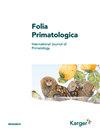A phased process to reintroduce a hand-reared infant Tonkean macaque to her natal group
IF 0.8
4区 生物学
Q2 ZOOLOGY
引用次数: 1
Abstract
Reintroduction of separated individuals into their social group is a major problem in the management of captive group of non-human primates. Here we report a case in captive Tonkean macaques in which a female infant was abandoned by her mother after birth, then removed, hand-reared, and reintroduced after weaning to her original group in several stages. After the initial phase of separation, a period of habituation to group members followed during which the infant was brought to the front of the group enclosure daily for two months. We then started a phased reintroduction process that lasted a year. Because the biological mother was the group member most attracted to the infant, the process began by allowing the two individuals to interact. In the next stages, we introduced the infant to the other individuals one after the other, starting with the females. Females then acted as protectors against potential male aggression. At the age of one year and two months, the introduced individual had fully integrated her original group. Two years later, she appeared to behave like the other group members. This report shows that a phased process can be used to reintroduce an infant to a macaque group containing several adult females and males.一个分阶段的过程,重新引入一个人工饲养的猕猴婴儿到她的出生群体
将分离个体重新引入其社会群体是非人灵长类动物圈养群体管理中的一个主要问题。在这里,我们报告了一个案例,在圈养的东京猕猴中,一个雌性婴儿在出生后被她的母亲遗弃,然后被带走,人工饲养,并在断奶后的几个阶段重新引入她原来的群体。在最初的分离阶段之后,接下来是一段适应小组成员的时期,在此期间,婴儿每天被带到小组围栏的前面,持续两个月。然后,我们开始了一个分阶段的重新引入过程,持续了一年。因为生母是最受婴儿吸引的群体成员,所以这个过程从允许两个人互动开始。在接下来的阶段,我们从雌性开始,一个接一个地把婴儿介绍给其他个体。然后雌性充当保护者,抵御潜在的雄性攻击。在一岁零两个月大的时候,被介绍的个体已经完全融入了原来的群体。两年后,她表现得和其他小组成员一样。该报告表明,一个分阶段的过程可以用来将一个婴儿重新引入一个由几只成年雌性和雄性猕猴组成的猕猴群体。
本文章由计算机程序翻译,如有差异,请以英文原文为准。
求助全文
约1分钟内获得全文
求助全文
来源期刊

Folia Primatologica
生物-动物学
CiteScore
3.30
自引率
10.50%
发文量
36
审稿时长
>12 weeks
期刊介绍:
Recognizing that research in human biology must be founded on a comparative knowledge of our closest relatives, this journal is the natural scientist''s ideal means of access to the best of current primate research. ''Folia Primatologica'' covers fields as diverse as molecular biology and social behaviour, and features articles on ecology, conservation, palaeontology, systematics and functional anatomy. In-depth articles and invited reviews are contributed by the world’s leading primatologists. In addition, special issues provide rapid peer-reviewed publication of conference proceedings. ''Folia Primatologica'' is one of the top-rated primatology publications and is acknowledged worldwide as a high-impact core journal for primatologists, zoologists and anthropologists.
 求助内容:
求助内容: 应助结果提醒方式:
应助结果提醒方式:


